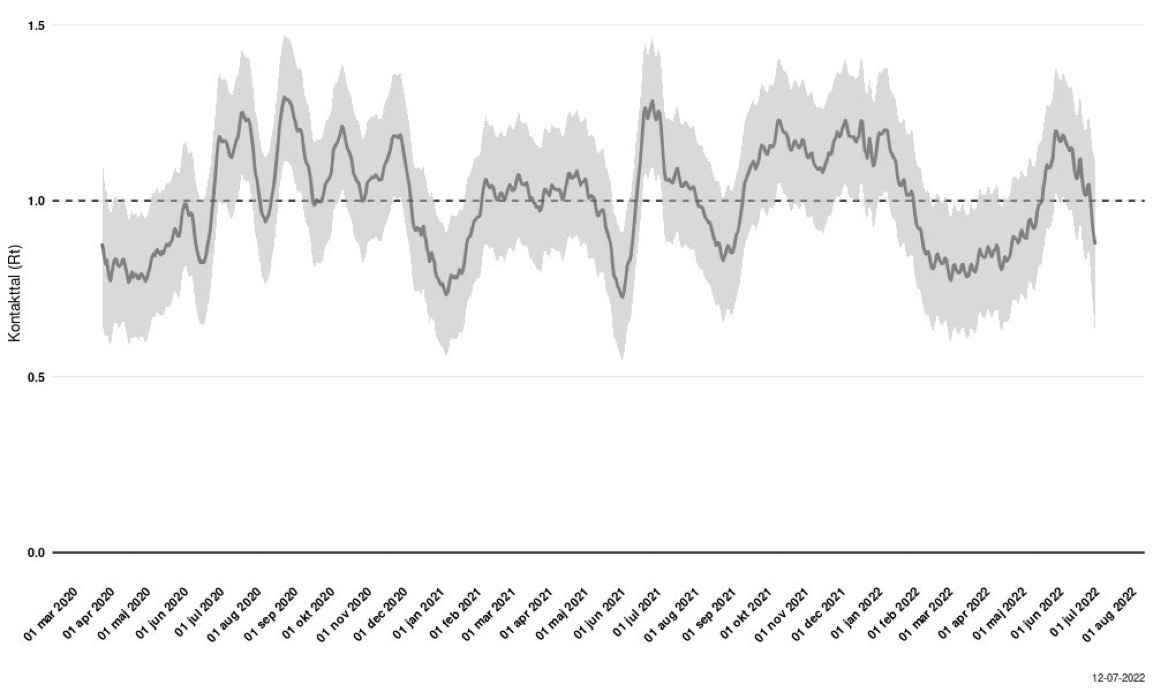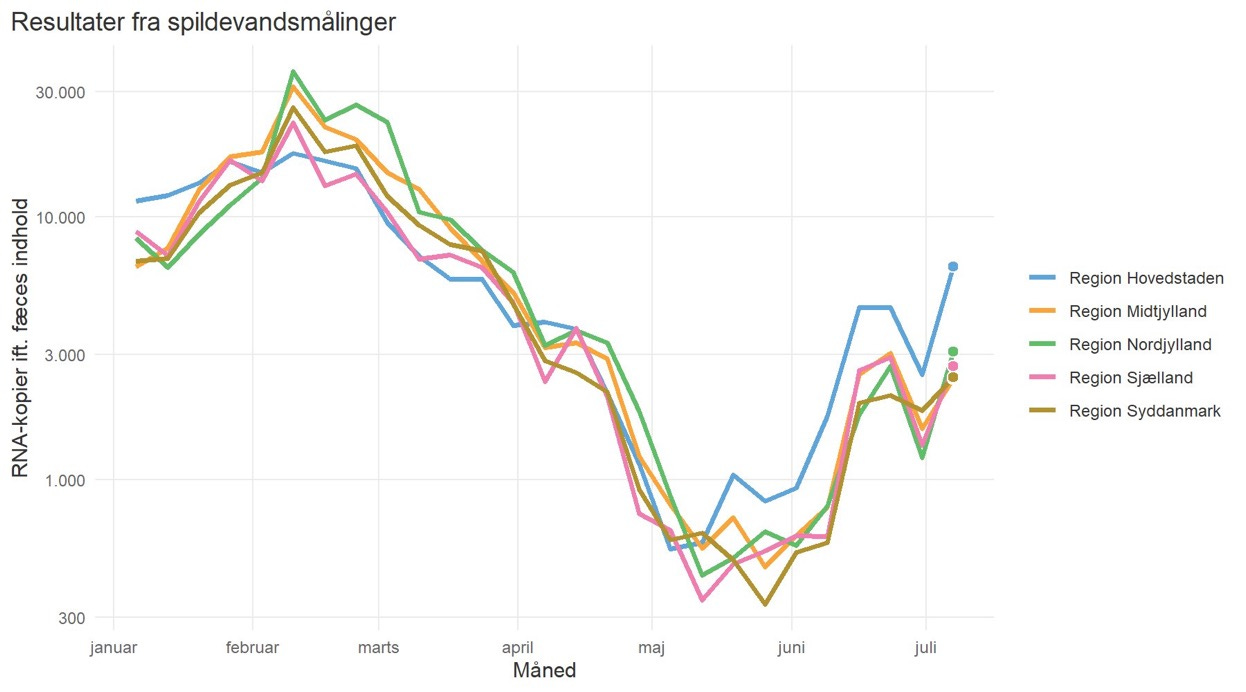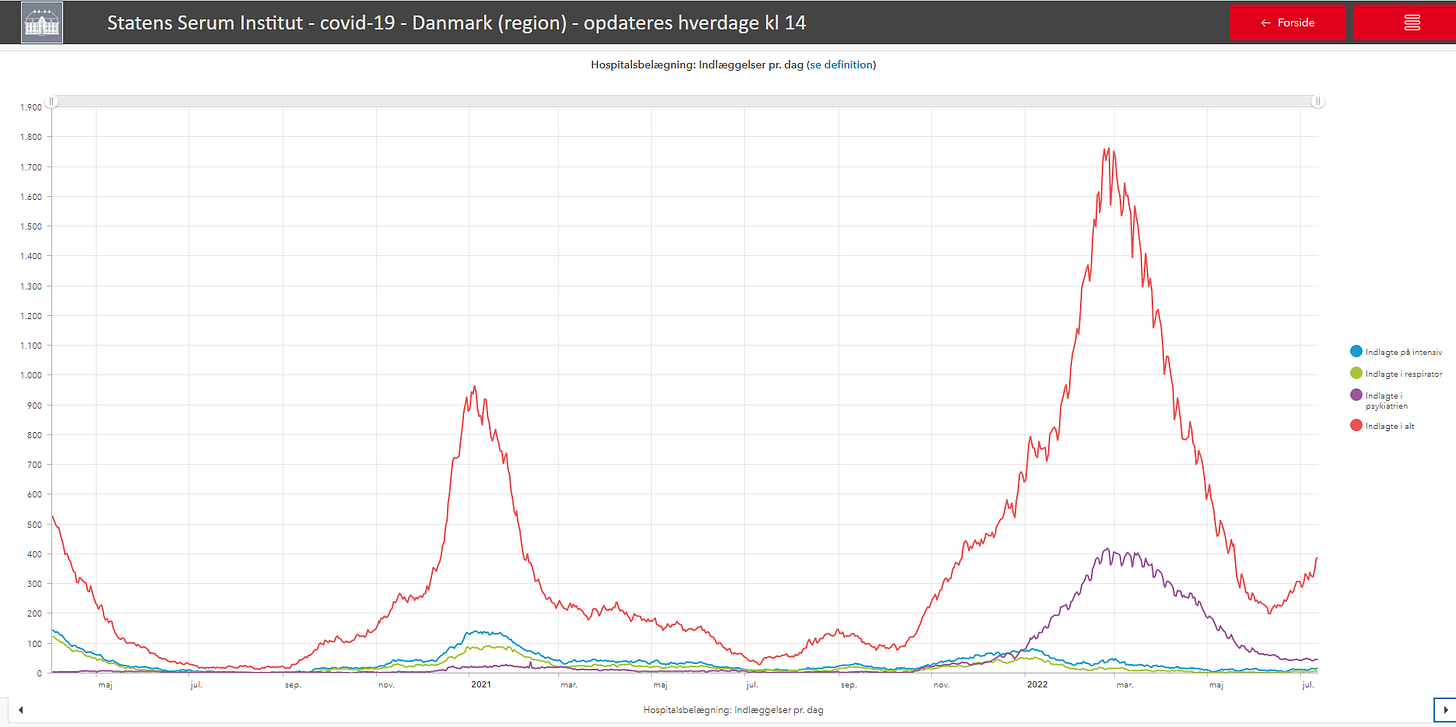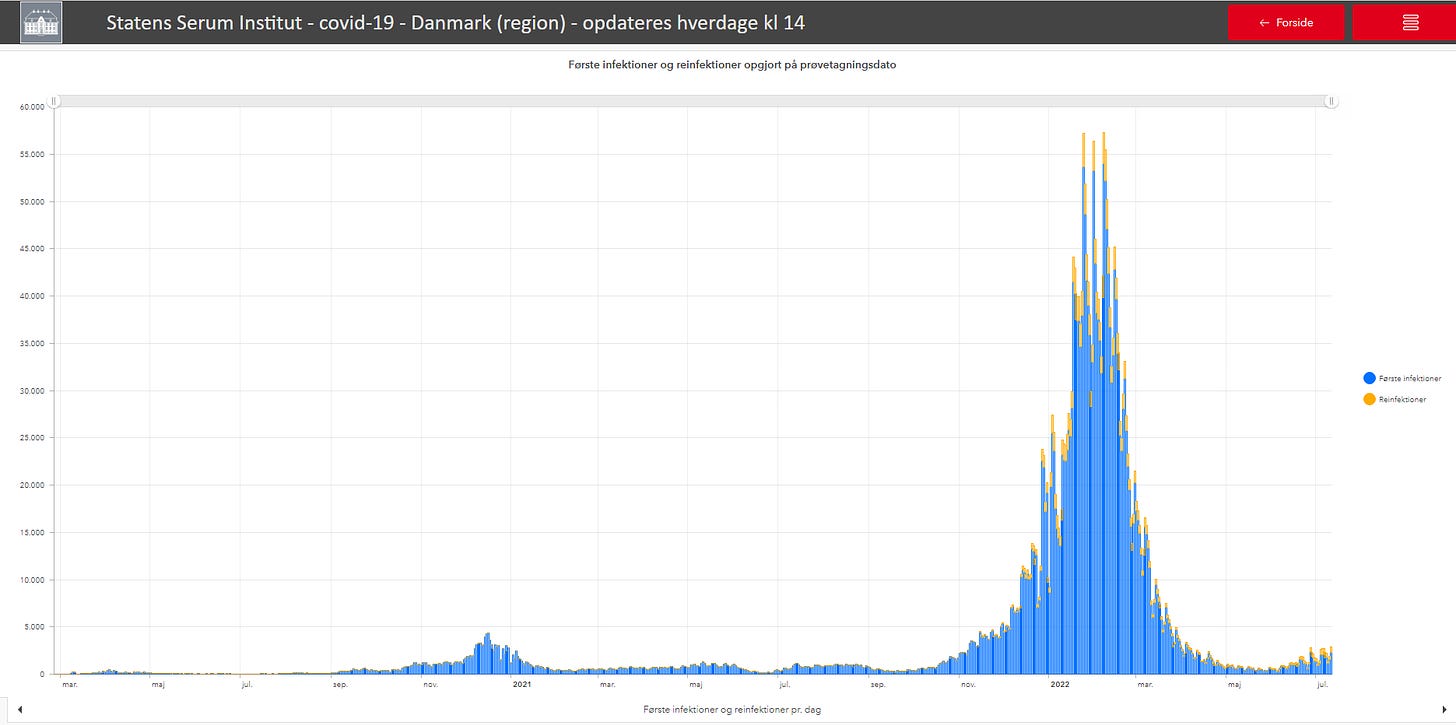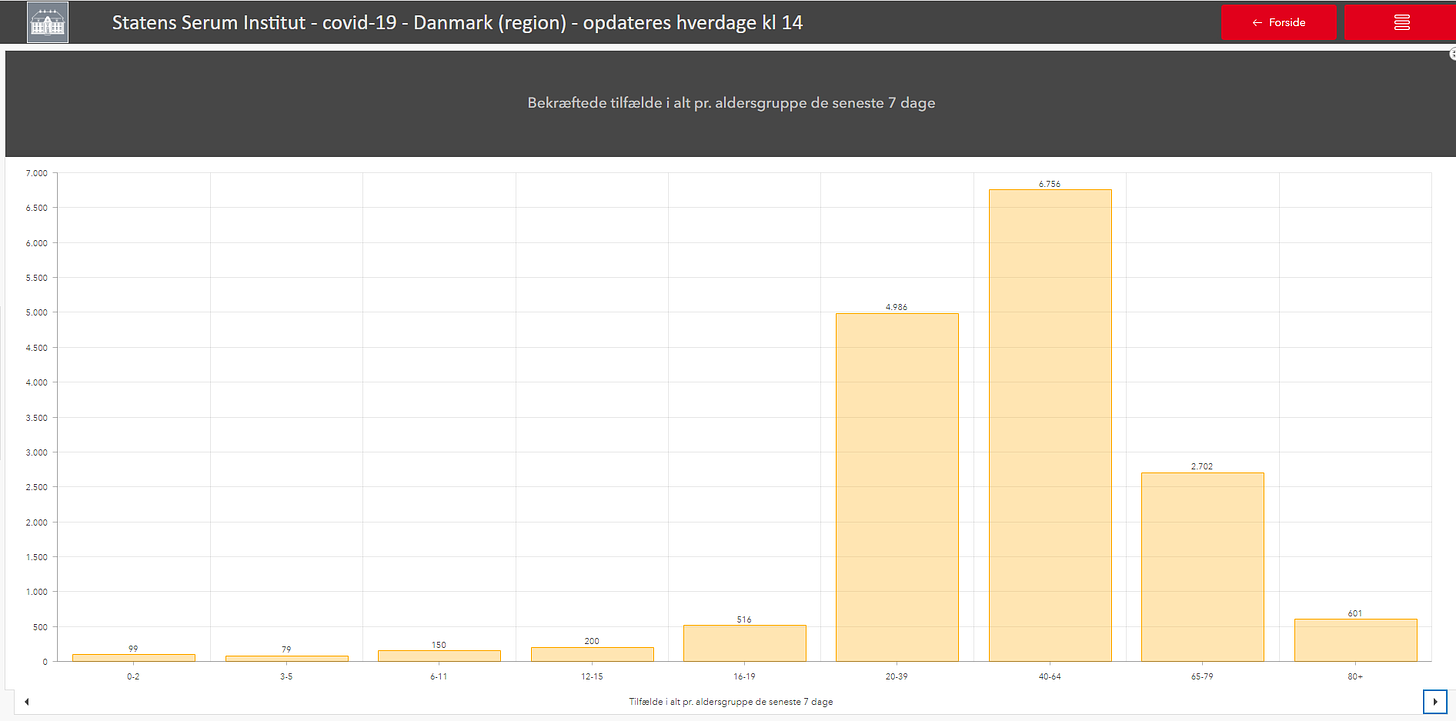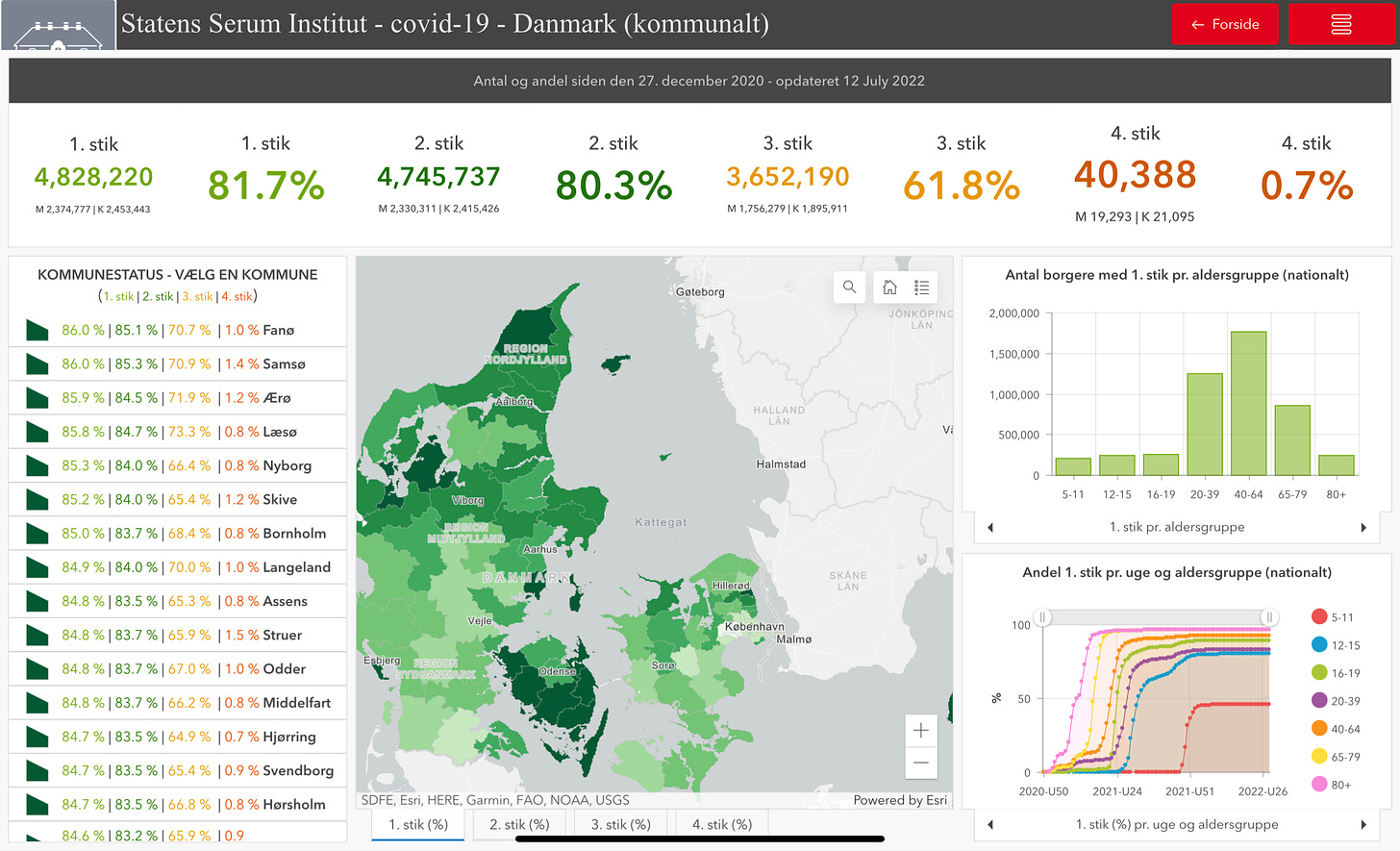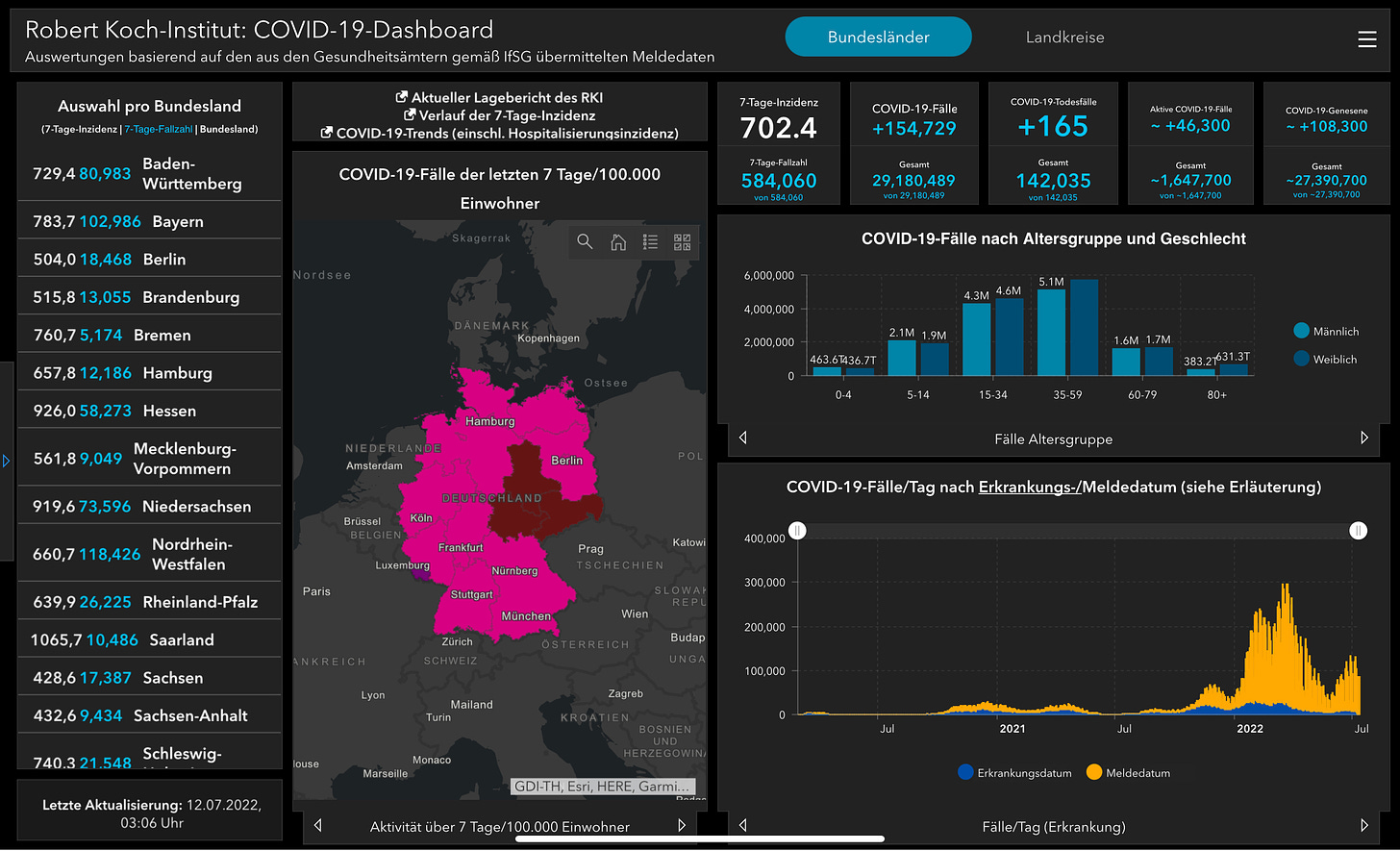The Evening Report - July 12
New COVID wave sweeps across Europe. Ukraine has a bone to pick with Canada.
🦠Pandemic🦠
🇪🇺🦠💉
“This signals the start of a new, widespread COVID wave across the European Union. There are still too many individuals at risk of severe infection whom we need to protect as soon as possible.”
In a joint statement, the European Medicines Agency and the European Centre for Disease Prevention and Control are recommending eligibility for a 2nd booster dose be immediately expanded to include seniors 60 years old and older and other high-risk populations.
ECDC Director Dr Andrea Ammon:
“We are currently seeing increasing COVID case notification rates and an increasing trend in hospital and ICU admissions and occupancy in several countries, mainly driven by the BA 5 sub-lineage of Omicron. We need to remind people of the importance of vaccination from the very first shot to the second booster. We have to start today.”
The agencies note that it is “critical” that the eligibility for another booster dose be expanded as fast as possible.
EU Commissioner for Health Stella Kyriakides:
“COVID vaccines work, and offer good levels of protection against severe illness and hospitalisation. With cases and hospitalisations rising again as we enter the summer, I urge everybody to get vaccinated and boosted as quickly as possible. There is no time to lose. I call on Member States to roll-out second boosters for everyone over the age of 60 as well as all vulnerable persons immediately and urge everyone eligible to come forth and get vaccinated. This is how we protect ourselves, our loved ones and our vulnerable populations.”
While the European health agencies urge that seniors and vulnerable populations get another booster dose, they are not applying the same urgency to those younger than 60. They say at the moment “there is no clear evidence” to support another booster dose for people under the age of 60. The same goes for healthcare workers and senior home staff unless they are high risk.
-
The European Medicines Agency says assessments of bivalent COVID vaccines, the upgraded mRNA booster designed to target two coronavirus strains, are continuing with more news to come this fall.
EMA’s Executive Director Emer Cooke:
“We are working towards possible approvals of adapted [bivalent]vaccines in September. Our human medicines committee is currently reviewing data for two adapted vaccines. In the meantime, it is important to consider using currently authorised vaccines as second boosters for people who are most vulnerable.”
The EMA is reviewing data for the newly formulated Moderna and Pfizer/BioNTech vaccines to determine that they are safe and effective. Once the assessment is complete, it will render a decision to recommend approval for use, or not.
🇩🇰
Denmark’s COVID contact number (reinfection rate or R0) has crept upward going from 0.8 to 0.9 week to week. The Danish Health Ministry says this still indicates the epidemic is declining.
That said, it also adds that COVID wastewater surveillance shows increasing virus activity in all five Danish regions.
-
COVID hospitalizations (388) are up since Friday (+63) while the number of severe infections in an ICU (17) has crept up (+3) and of those the number on a ventilator (5) dipped slightly (-1). Infection admissions to a psychiatric ward (46) are up (+4).
-
Since Friday, Denmark has reported 8,542 COVID infections (underreported), including 1,670 reinfections, and 20 more coronavirus deaths.
Yesterday there were 12,626 PCR tests taken equaling a positivity percentage of 23.41%, over seven days it is 25.9%.
-
Over the last seven days, new COVID infections have been concentrated heavily among those 20 to 79 years old, but especially in the 40 to 64-year-old age group.
-
There isn’t much change on the vaccination front.
🇸🇪
The Swedish Public Health Agency only reports COVID data once a week, every Thursday.
-
Officials in Region Skåne say the infection spread in southern Sweden appears to be slowing.
Infection Control Doctor Eva Melander says the number of new cases is increasing slightly but not to the same extent as the last few weeks.
Melander says there were 161 hospitalized coronavirus patients last week, about the same number as the week before. The positivity percentage is also treading water. And COVID wastewater surveillance has dropped significantly from one week to the next.
The region is urging people to get vaccinated. If they feel sick, they should stay home. And any contact with high-risk groups including seniors should be avoided.
On September 1, the region is preparing for another vaccination campaign as the Swedish Public Health Agency recommends a 4th dose for all seniors 65 years old and older this fall.
-
The number of COVID patients in Sweden’s capital region has dipped slightly. There were 174 severe infection cases in hospitals in Region Stockholm last week, nine fewer than the week before. Three people were in intensive care. There is still a roughly 50/50 split between people being hospitalized because of an infection and those with an infection but needing care for a non-pandemic reason. Again, unvaccinated or partially vaccinated people are “over represented” in the hospital system.
Chief Physician Elda Sparrelid:
“There are fewer patients than last week and it is gratifying that the number of COVID patients has not increased further. We are aware that the numbers may vary for some time to come and we have a plan in case the number of patients continues to increase.”
But, Sparrelid adds one week does not make a trend rather, hospitalization numbers need to keep falling for three or four weeks in a row before they can bank on the infection wave easing.
“Even though the vaccinations provide less protection against becoming infected with the new sub-variants of Omicron, we know that the vaccines provide very good protection against suffering from severe infections, hospitalization, and death. Therefore, I would like to ask you to take your vaccination doses.”
Last week, there were 1,104 new infection cases, but that number is under-reported due to Sweden restricting PCR testing to seniors in care and people being hospitalized.
There were five more coronavirus deaths in Region Stockholm last week. The region continues to warn that Sweden is still dealing with a backlog in reporting COVID deaths, as it has for many months now.
-
A number of Swedish Regions have reintroduced face mask recommendations inside hospitals and other healthcare facilities according to Sweden’s Radio Ekot. With COVID cases rising sharply in Sweden, the regions are trying to curb infection spread.
Region Västernorrland Infection Control Doctor Hans Bohman:
“It is to reduce the risk of transmission of infection to patients and care recipients but also between staff.”
🇩🇪
Germany recorded another 154,729 infections and suffered 165 more deaths since its update on Monday.
It added 1,914 hospitalizations, while ICU numbers (1,173) increased (+72). As a percentage of all intensive care beds in the country coronavirus patients are using 5.5%.
To date, 77.8% of the total population has one vaccine dose, 76.2% have two, and 61.7% have a booster shot.
WHO/🦠
The WHO Emergencies Committee met this week to discuss the COVID pandemic as global case numbers rise 30% in the last two weeks.
WHO Director General Dr. Tedros Adhanom Ghebreyesus said coronavirus is “running freely” and countries are “not effectively managing the disease burden.” He especially emphasized that with more infections will come increasing numbers of people suffering from long-COVID.
“I am concerned that cases of COVID continue to rise, putting further pressure on stretched healthcare systems and health workers and deaths are unacceptably high.”
WHO officials in the meeting continued to hone in on what they called a “major disconnect” on the COVID risk between scientific communities, politicians, and the public.
Dr. Mike Ryan said the WHO and other public health officials are blindly navigating this infection wave due to a steep decline in testing and sequencing numbers. Ryan says that is hindering detection of infections and the ability to monitor the evolution of the virus itself. He says this is a dangerous combination and countries need to reverse course and ramp up testing and sequencing again.
-
As COVID cases rise around the world again driven by new variants, the World Health Organization is urging that countries act to protect the most vulnerable. The WHO is recommending another booster dose be administered to high-risk and vulnerable populations between now and the fall.
Europe Regional Director Hans Kluge:
“A booster dose should be given to immunocompromised people and should also be considered for other vulnerable groups in order to reduce the risk of severe infections.”
Kluge says another booster dose is needed due to the new Omicron sub-variant BA.5, which has a higher degree of immune escape than any other previous variant.
“In our daily lives, we must remember that the virus is still among us. Enjoy the summer, but do it safely and a get another vaccine dose if you are entitled to it.”
Fall vaccination campaigns are being planned in many countries, including Denmark, which plans to offer a 4th dose to all high-risk and vulnerable populations as well as anyone 50 years old and older.
🇺🇸
COVID hospitalizations in the United States are rocketing upward. With the BA.5 variant now accounting for about 65% of all sequenced positive test results, the weekly number of hospitalizations has doubled since May.
🇨🇳
China continues to enforce its Zero COVID policy. After a single infection was confirmed in the city of Wugang, Chinese officials have locked down the city’s 320,000 residents. A three day lockdown began on Monday and is expected to be lifted at noon on Thursday. The nearby city of Zhumadian, with a population of seven million people, also began lockdown of its city center for three days beginning Tuesday.
🦠Monkeypox🦠
The World Health Organization says there are now 9,200 confirmed monkeypox cases across 63 countries around the world. The WHO will reconvene its Emergency Committee next week to take another look at the monkeypox outbreak. A few weeks ago, the committee decided the outbreak did not qualify as a ‘global public health emergency.’
WHO Director General Dr. Tedros Adhanom Ghebreyesus:
“I again stress that we must work to stop onward monkeypox transmission and advise governments to implement contact tracing to help track and stem the virus, as well as to assist people in isolation.”
🇸🇪
Doctors in Sweden are lobbying for a vaccination campaign against monkeypox. So far, 43 cases of monkeypox have been confirmed in Sweden. But, the hospitalization rate for the infection is quite high, about 25% according to Swedish health officials.
Chief Physician at Södersjukhuset hospital Finn Filén spoke to Radio Sweden and said the strain on the healthcare system is growing,
“It has become a rather difficult situation now, which heavily affects our regular work. We have had to lockdown quite a bit of our regular work.”
🇺🇦/ 🇷🇺 War
🇺🇦/ 🇨🇦
Ukrainian President Volodymyr Zelenskyy reacted to Canada, sending back a turbine to Germany, an end run around sanctions, for the Nord Stream 1 pipeline bringing Russian gas into Europe. Zelenskyy says the Canadian envoy to Ukraine was called on to the carpet over the move. He called it “an appeasement” and a “concession” to Russia. In the video below he warns that Russia will view this as a weakness and to expect that it will, at the most opportune moment, turn off all the gas to Europe in order to to try force the EU to submit to its will.

-
The Ukrainian World Congress announced on Tuesday it had filed a legal action in the Federal Court of Canada seeking to drop the return of the Russian-owned Nord Stream 1 turbines.
🇪🇺/ 🇷🇺
Something to keep an eye on as another potential escalation point in tensions between Russia and Europe. The Nord Stream 1 gas pipeline from Russia to Germany was shut down on Monday due to regular maintenance. The pipeline is due to come back online on July 21, but both Germany and France are preparing for a worst-case scenario where Russia just turns off the taps and keeps them off. It has already used a number of weak excuses to choke off gas supplies to Europe to lash out over the EU’s support of Ukraine and the sanctions it is imposing on Russia.
European sanctions levied over Russia’s invasion of Ukraine now directly target Russian oil and gas. European countries, and the EU as a whole, are accelerating efforts to become completely independent of Russian gas. Germany has already declared an emergency over gas supplies and is preparing for emergency action this winter, including possible gas rationing. The EU as a whole is looking to top up all gas reserves this summer to provide a backstop in the event Russia does what is expected, and continues to weaponize gas exports against Europe.
Germany, which is overly reliant on Russian gas, is working to wean itself off as fast as possible. Among initiatives to address the energy crisis, it is preparing to restart ten coal-fired power plants.
-
Billions of euros worth of Russian assets have been frozen in the European Union but the EU’s Justice Commissioner thinks a lot of money is still being left on the table.
EU Commissioner for Justice Didier Reynders spoke to Reuters:
“Currently, we have frozen 13.8 billion euros from oligarchs, so it is quite large.”
But Didiers added that the lion’s share of the seizures, about €12 billion worth, came from just five EU countries. He wouldn’t name the countries, but did say other European nations could and should be doing a lot more.
“We must convince other countries to also freeze Russian assets. We have sent a letter to several of the Member States to explain how they can do it best. I hope that in the coming weeks we will see an increase in all Member States.”
-
The European Union is working on another package of sanctions to throw on the pile Russia is facing already. This would be a 7th round of sanctions levied by Europe. While we will have to wait to see what the details are when it is officially announced, there are reports that the EU will target restrictions on the import of Russian gold. This would put the EU in line with both Canada and the United States, who have already sanctioned Russian gold.
The internal struggle continues in the EU in crafting sanctions against Russian gas supplies, with countries like Poland pushing for harsh restrictions while countries like Hungary refusing to play along. Another possible sanctions avenue would be to target Gazprombank. So far, it has avoided any sanctions. That is the Russian bank through which western countries pay for Russian oil and gas. It is also the bank Russia uses to pay its soldiers fighting in Ukraine.
🇫🇮 🇸🇪/ NATO
Poland is the latest NATO country to ratify the membership applications of Sweden and Finland. 442 Polish members of parliament voted yes to ratification with no votes against and no abstentions.
Poland joins Germany, Albania, Canada, the United States, the United Kingdom, Denmark, Norway, Iceland, the Netherlands, and Estonia who have all also voted to ratify. All 30 NATO member countries must vote yes for Finland and Sweden to join the military alliance as full members.
-
While Finland and Sweden wait on the process of gaining full NATO membership, there is no time being wasted in getting both countries synced in on a military level. Last week French Mirage fighter jets were in Finland doing joint training with Finnish F-18s. This week British Royal Air Force Typhoon and F-35 fighters are in Sweden doing exercises with Swedish Gripen fighter jets.
NATO/ 🇷🇺
NATO said that on two occasions French Air Force Mirage fighter jets were scrambled from NATO airfields in Estonia last week to intercept Russia military aircraft. In a release, the alliance says the Russian aircraft were flying near NATO airspace above international waters. Jets were ordered to launch to keep an eye on the Russian aircraft and “establish the facts” via an airborne interception.
🇩🇪/ 🇷🇺
Germany is beefing up its cybersecurity defenses due to Russia’s invasion of Ukraine and its overall increasing aggression. One part of its strategy is to better safeguard and build in “cyber resilience” for critical infrastructure. Those would be businesses covering the transport, food, health, energy, and water supply sectors. IT infrastructure for everything from intelligence agencies to state and federal authorities will be upgraded and made more secure.
🇳🇱/ 🇺🇦
Dutch Prime Minister Mark Rutte visited Kyiv this week meeting with Ukrainian President Volodymyr Zelenskyy. During his visit Rutte pledged that the Netherlands will provide more long-range heavy artillery to Ukraine. He also said the Netherlands will provide a new €200 million aid package to the war-torn country.
🇱🇹/ 🇷🇺
Undeterred by Russia’s bluster and posturing at the border, on Monday, Lithuania expanded trade restrictions through its territory to the Russian enclave of Kaliningrad. This is due to recently expanded European Union sanctions against Russia for its invasion of Ukraine.




